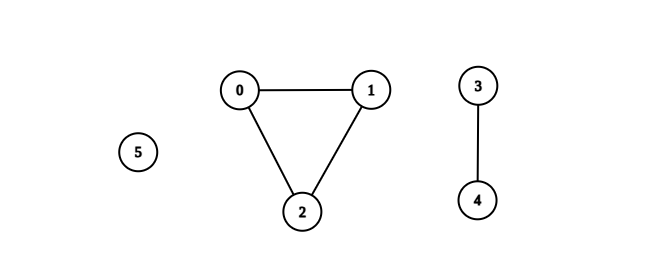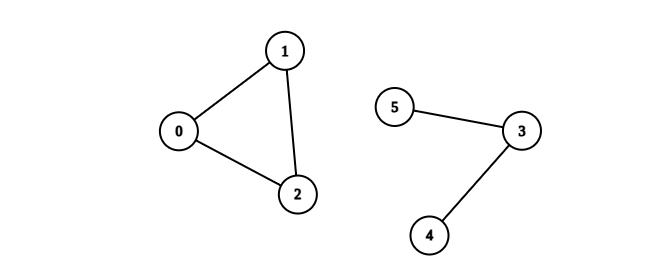LeetCode-in-Java
2685. Count the Number of Complete Components
Medium
You are given an integer n. There is an undirected graph with n vertices, numbered from 0 to n - 1. You are given a 2D integer array edges where edges[i] = [ai, bi] denotes that there exists an undirected edge connecting vertices ai and bi.
Return the number of complete connected components of the graph.
A connected component is a subgraph of a graph in which there exists a path between any two vertices, and no vertex of the subgraph shares an edge with a vertex outside of the subgraph.
A connected component is said to be complete if there exists an edge between every pair of its vertices.
Example 1:

Input: n = 6, edges = [[0,1],[0,2],[1,2],[3,4]]
Output: 3
Explanation: From the picture above, one can see that all of the components of this graph are complete.
Example 2:

Input: n = 6, edges = [[0,1],[0,2],[1,2],[3,4],[3,5]]
Output: 1
Explanation: The component containing vertices 0, 1, and 2 is complete since there is an edge between every pair of two vertices. On the other hand, the component containing vertices 3, 4, and 5 is not complete since there is no edge between vertices 4 and 5. Thus, the number of complete components in this graph is 1.
Constraints:
1 <= n <= 500 <= edges.length <= n * (n - 1) / 2edges[i].length == 20 <= ai, bi <= n - 1ai != bi- There are no repeated edges.
Solution
public class Solution {
private static class DSU {
int[] roots;
int[] sizes;
DSU(int n) {
roots = new int[n];
sizes = new int[n];
for (int i = 0; i < n; i++) {
sizes[i] = 1;
roots[i] = i;
}
}
public int find(int v) {
if (roots[v] != v) {
roots[v] = find(roots[v]);
}
return roots[v];
}
public void union(int a, int b) {
int rootA = find(a);
int rootB = find(b);
if (rootA == rootB) {
return;
}
roots[rootB] = rootA;
sizes[rootA] += sizes[rootB];
}
}
public int countCompleteComponents(int n, int[][] edges) {
DSU dsu = new DSU(n);
int[] indegree = new int[n];
for (int[] e : edges) {
dsu.union(e[0], e[1]);
indegree[e[0]]++;
indegree[e[1]]++;
}
int[] gcount = new int[n];
int res = 0;
for (int i = 0; i < n; i++) {
int root = dsu.find(i);
if (dsu.sizes[root] == (indegree[i] + 1)) {
gcount[root]++;
}
if (gcount[root] == dsu.sizes[root]) {
res++;
}
}
return res;
}
}

